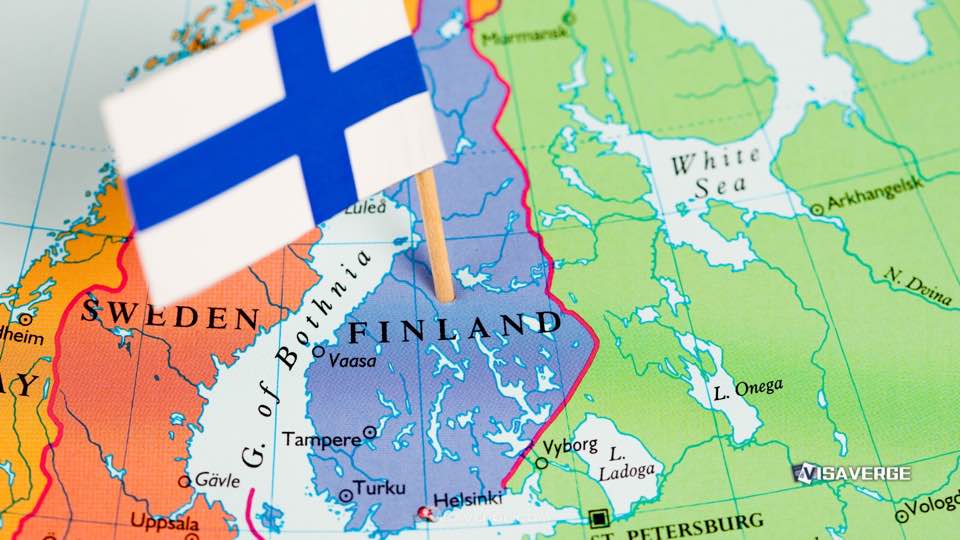Key Takeaways
• From January 1, 2025, Finland requires a €1,600 monthly minimum income for work-based residence permits.
• Foreign professionals in shortage occupations can switch jobs without reapplying for a new residence permit.
• In 2023, Finland granted 42,200 permits to foreign workers, nearly 14% fewer than in 2022.
Finland has become a popular destination for people who want to work and live in a place known for fairness, strong social systems, and a great lifestyle. Finnish work policies have recently changed in ways that make it much easier for foreign professionals to join the workforce, especially when looking at the country’s changing needs and the global search for talented workers. These changes not only help Finland 🇫🇮 manage skill shortages in many job sectors but also give foreign professionals clear paths to build successful careers and lives in this Nordic nation.
Let’s take a close look at the latest developments in Finland’s work policies, the main sectors searching for talent, available visa types, important work benefits, support systems for newcomers, and how foreign professionals impact Finland 🇫🇮 as a whole.

Finland’s Updated Work Permit System
Starting January 1, 2025, Finland 🇫🇮 is updating its rules for people from other countries who want to work there. The country will set a new minimum income requirement: €1,600 per month for anyone applying for a work-based residence permit. This means employers must pay foreign workers at least this amount, which is meant to make sure that no one needs to rely on social benefits to get by. These changes were reported by multiple sources and are aimed at keeping the country’s job market fair and stable for both local and foreign employees.
Another important update is the flexibility Finland 🇫🇮 is now offering to foreign workers in shortage occupations (jobs that don’t have enough local workers). People in these jobs will be able to switch employers or positions without having to apply for an entirely new residence permit each time. This removes much of the stress and extra paperwork, letting foreign professionals move more freely within Finland’s job market once they are in the country.
Despite these steps, there has been a drop in the number of foreign workers getting permits. In 2023, Finland 🇫🇮 granted 42,200 residence permits to foreign employees, down almost 14% from 2022. The first months of 2024 saw only 11,000 applications, which is 4,000 fewer compared with the same period the year before. This dip means the country is eager to attract more professionals and has started to make it easier for talented individuals to come and stay.
Sectors With High Demand for Foreign Professionals
The Finnish government has pinpointed nine key groups of jobs where there simply are not enough qualified local workers. Some of these include:
- General practitioners and specialist doctors
- Audiologists and speech therapists
- Metal processing operators
- Nurses and nursing assistants
- Dental hygienists
- Funeral directors
- Firefighters
These are jobs where Finland 🇫🇮 needs urgent help. Many require higher education degrees or local recognition of credentials, which means foreign professionals looking for these opportunities must have the right qualifications and may need their diplomas or licenses approved by Finnish authorities.
Healthcare and technology lead the count among high-demand sectors. The country’s strong technology sector means that professionals with digital, computing, or engineering skills are also prized. Emergency services, such as firefighting, are seeking dependable workers who are quick to learn and dedicated. As these shortages become more pressing, Finland 🇫🇮 is sending a clear message: skilled workers from around the world are welcome and needed.
Types of Work Visas and Permits in Finland
To support its need for workers, Finland 🇫🇮 has a detailed system of visa and permit options for foreign professionals. Each is designed for different backgrounds, professions, and personal goals. The main options are:
1. EU Blue Card:
This special permit is for highly qualified workers. To be eligible, you need a university degree and a job offer that meets a specific salary minimum (set by EU standards). The EU Blue Card can make it easier for professionals to move between EU countries in the future.
2. Residence Permit for an Employed Person (TTOL):
This is the most common route for many foreign professionals. It applies to a broad range of jobs and professions, regardless of sector, and is often used by people coming from outside the European Union.
3. Residence Permit for a Specialist:
This permit is for foreign workers who have deep skills or knowledge in a particular field, especially those that are in high demand in Finland 🇫🇮. For example, technology experts or senior engineers can often use this permit.
4. Residence Permit for a Start-up Entrepreneur:
If you want to move to Finland 🇫🇮 to start your own business, this permit is for you. It’s meant for enterprising people who can bring new ideas and create jobs for others.
5. Seasonal Work Visa:
Farm workers, people in tourism, or anyone looking for temporary work in sectors tied to the seasons (like berry-picking in summer) can apply for this visa, which is designed for shorter stays.
Each of these options comes with its own requirements. Many need an employment contract or a clear business plan, proof of income, and sometimes specific qualifications. You can find all the official forms and up-to-date information about these permits on the Finnish Immigration Service’s website. This site provides clear step-by-step guides for each application type.
Strong Work Benefits and Employment Rights
Finland 🇫🇮 is well-known for offering a high quality of life, and that starts at work. The country’s labor laws and employment policies are among the most protective and supportive in the world. Foreign professionals enjoy:
- Five weeks of paid vacation each year
- Generous maternity, paternity, and parental leaves
- Flexible working hours, so employees can balance work and home life
- Equal treatment under the law, no matter where a person is from
Employers are legally required to treat foreign professionals the same as Finnish employees. This is not just a promise on paper; Finland 🇫🇮 enforces these rules to make sure everyone is paid fairly and gets the same work benefits. The work environment favors respect, communication, and cooperation, making it easier for new arrivals to adjust to the Finnish way of working.
Furthermore, labor unions and workplace councils are active in looking out for worker rights. These organizations can help foreign professionals if they have any problems or questions about their contracts, pay, or job duties. Workers can always turn to Finland’s official labor protection site for help, as highlighted in VisaVerge.com’s investigation. This is a good starting point for anyone who wants to know more about their rights and protections in the workplace.
Support for Cultural Integration
Moving to a new country can be hard, not just because of work but because of the need to adapt to new customs, language, and ways of life. Finland 🇫🇮 understands this challenge and works hard to help foreign professionals and their families fit in. The government has set up many programs and services, including:
- Free or low-cost language courses, so new arrivals can speak Finnish or Swedish, the country’s main languages
- Courses and events explaining local culture, workplace customs, and daily life in Finland 🇫🇮
- Job training or skill-updating programs to help new residents find work that matches their abilities
- Guidance on getting foreign qualifications recognized (for example, making sure a medical or teaching diploma from another country is accepted in Finland 🇫🇮)
- Networking events and mentoring, making it easier for newcomers to meet people in their field and find job opportunities
These support systems are not just for workers—they also include help for family members, from finding schools for children to connecting with local community groups. This focus on well-being and belonging makes starting a new life in Finland 🇫🇮 less stressful and more welcoming.
Finland’s Work Culture: What to Expect
The Finnish workplace pays a lot of attention to values like punctuality, honesty, and equality. Meetings tend to start and finish on time. People are expected to keep their promises and be direct in communication, which means what’s said is usually meant seriously. There’s not much hierarchy—the boss is more likely to be called by their first name than by their job title. This kind of culture often surprises foreign professionals but is also one of the reasons many come to enjoy working in Finland 🇫🇮.
Teamwork is important, but so is independence. Employers trust workers to do their jobs without being closely watched. This blend of fair management and personal responsibility appeals to many foreign professionals, especially those from countries where rules are stricter or workplaces are more controlling.
Why Foreign Professionals Matter to Finland
Finland 🇫🇮 is facing changes in its population: more people are getting older, and there are fewer young workers entering the job market. Without help from foreign professionals, it will be tough for the country to keep growing and to continue offering strong public services, especially in healthcare.
The impact of having international professionals is clear:
- More jobs are filled in critical sectors like healthcare, technology, and emergency services
- Productivity in Finnish companies goes up, making them more competitive
- Foreign professionals bring different ideas, which can lead to new products and ways of working
- Companies owned or run by international workers can encourage foreign investment and trade
- Society becomes more open and diverse, with people from all backgrounds feeling welcome in Finland 🇫🇮
These benefits have real effects not just on the economy but on everyday life. Schools, restaurants, and communities are now more multi-cultural, with traditions and holidays from many countries celebrated across Finland 🇫🇮.
The Long-Term View: A Two-Way Commitment
Finland’s move to update work policies and make its labor market more flexible is not just about solving short-term shortages. The government knows that foreign professionals will play a key role in shaping the country for many years to come. The expectation is that these new residents will settle in, contribute, and eventually call Finland 🇫🇮 home.
At the same time, Finland 🇫🇮 is also making a commitment to these workers: to ensure fair treatment, equal opportunities, and a good quality of life. The work policies now in place are meant to remove many barriers—like complicated paperwork or unfair pay—so foreign professionals can focus on their jobs and lives.
Useful Information and Next Steps
If you are a foreign professional thinking about moving to Finland 🇫🇮, the best first step is to check the official immigration pages for regularly updated requirements and forms. Employers hoping to bring in workers also have clear rules to follow, so the process is transparent and fair for everyone involved.
What you need to know:
- Minimum income requirement for new work permits is €1,600 monthly from January 1, 2025
- Workers in shortage occupations can change jobs or employers with less hassle
- Various visa types exist for employed persons, specialists, start-ups, and seasonal work
- Finland 🇫🇮 offers many programs to ease your arrival, from language lessons to job-matching
These steps taken by the Finnish government show a genuine interest in including foreign professionals as an important part of the country’s future. For those with the right talents and a desire to build a new life, Finland 🇫🇮 offers a mix of practical support, legal clarity, and a welcoming culture.
As reported by VisaVerge.com, the country’s progressive approach to migration sets a strong example for other nations looking to benefit from international talent while treating foreign professionals with the fairness and respect they deserve. This combination makes Finland 🇫🇮 a top choice for those who want more than just a job—they want a chance for a better life.
Learn Today
EU Blue Card → A special work permit for highly qualified workers, requiring a university degree and a job with a minimum EU-set salary.
Shortage Occupations → Job sectors in Finland lacking enough local workers, prioritized for foreign recruitment under flexible immigration policies.
Residence Permit for an Employed Person (TTOL) → A common Finnish work visa for non-EU nationals, allowing employment across a wide range of occupations.
Minimum Income Requirement → The lowest monthly salary (€1,600 from 2025) mandated for foreign workers to be eligible for residence permits in Finland.
Recognition of Qualifications → The process of getting foreign professional degrees or licenses officially accepted for work in Finland.
This Article in a Nutshell
Finland is making it easier for foreign professionals to work and settle, responding to skill shortages and shifting demographics. Changes, like minimum salary rules and flexible permits, create new opportunities. Comprehensive support, integration programs, and a strong work culture make Finland an appealing, fair choice for global talent seeking a better life.
— By VisaVerge.com
Read more:
• H1B to H4 Visa Transfer Process: Advantages, Disadvantages, and How to Do It
• Employer Change Restrictions for OPT: F-1 Visa Work Rules and Employment Authorization
• How can a PERM application impact the visa status of an employee’s dependents?
• Working Remotely for a Foreign Company on an H-4 Visa in the U.S.













